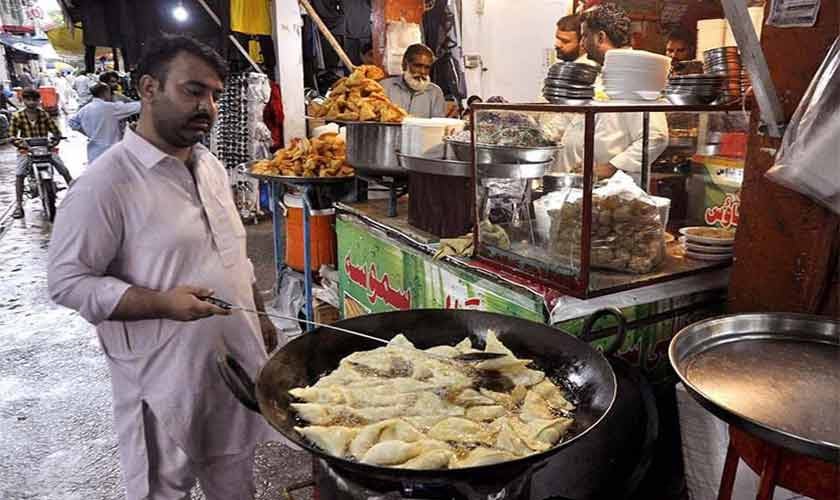Walk through any bustling bazaar in Islamabad, Karachi, Lahore, Quetta, or Peshawar, and the scene is the same: rows of golden samosas frying in deep pans, shelves stacked with shiny packets of biscuits, and bakeries offering freshly iced cakes. These foods are woven into our culture and daily lives, bringing people together across tables, classrooms, and celebrations.
But hidden behind their aroma and appeal is a silent killer — partially hydrogenated oils (PHOs). For decades, PHOs have been the invisible ingredient giving our snacks a longer shelf life and our fried foods their familiar crisp.
What most Pakistanis do not realize, however, is that PHOs are the single biggest source of industrially produced trans-fatty acids (iTFAs), a toxic substance that directly contributes to heart disease, strokes, diabetes, and several types of cancer.
According to the World Health Organization, more than 500,000 people die every year globally due to trans-fat intake. Pakistan is no exception: the growing epidemic of non-communicable diseases (NCDs) in our country is fueled in large part by what is on our plates. The oils that make our everyday foods affordable and tasty are also cutting short lives and robbing families of loved ones at the peak of their productivity.
During a briefing jointly organized by Pakistan Youth Change Advocates and the Centre for Peace and Development Initiatives, we were first introduced to the issue of partially hydrogenated oils in Pakistan’s food system a few months ago. The discussion was part of the broader TRANSFORM Pakistan campaign, led by PYCA, which has been working to highlight the dangers of industrial trans fats and push for stronger national policies.
Like many others, we had assumed that oils sold in our markets were broadly safe as long as they were properly labelled and regulated. What we learned instead was deeply concerning: despite global consensus that PHOs are toxic and unsafe at any level of consumption, Pakistan allows their production, import, and sale. They are used in bakery shortenings, margarine, packaged snacks, and street foods nationwide.
This revelation was not just a matter of personal concern — it was a wake-up call.
As convener of the Parliamentary Taskforce on the Sustainable Development Goals (SDGs), I could immediately see how this single issue touches upon several of our most pressing goals: good health and well-being (SDG 3), reducing inequalities (SDG 10), and responsible consumption (SDG 12).
The dangers of PHOs are no longer up for debate. Unlike naturally occurring fats, which the human body can process in moderation, trans fats created through industrial hydrogenation are toxic even in small amounts. They raise bad (LDL) cholesterol, lower good (HDL) cholesterol, and clog arteries — directly leading to heart disease.
Children exposed to trans fats are more likely to develop long-term health complications. Adults consuming them face heightened risks of premature death. Women are disproportionately affected, with a higher risk of heart diseases and other ailments.
Every doctor, every nutritionist, and every global health authority is in agreement: eliminating PHOs from the food supply is one of the most cost-effective interventions governments can undertake to save lives.
Several countries such as Denmark, Saudi Arabia, Thailand, and Egypt have already taken decisive action by placing a complete ban on PHOs to protect their populations. The WHO has called for the global elimination of industrially produced trans fats by 2025. Many countries are on track to achieve this.
Pakistan has taken a step in the right direction by placing a national limit of less than 2 percent of iTFAs in all fats in all foods through the Pakistan Standards and Quality Control Authority. While this regulatory cap is commendable as a starting point, it does not go far enough.
As long as partially hydrogenated oils remain legal, they will continue to enter our food system and undermine the spirit of the regulation.
This is why leading nutrition and health experts recommend a two-pronged strategy: maintain the strict 2 percent limit on iTFAs in all foods, and implement a complete ban on the production, import, and sale of PHOs. By combining these measures, Pakistan can more effectively protect public health by blocking trans fats at both the ingredient and product stages.
Without a full ban, regulatory loopholes and inconsistent enforcement will allow dangerous trans fats to persist in our food supply.
Some might argue that voluntary measures or industry pledges could help reduce PHOs. But history has shown that without binding legislation, progress is patchy and slow. Manufacturers will always have an incentive to use PHOs because they are cheap and extend shelf life. Only a clear, enforceable ban can ensure that all food sold in Pakistan — whether in a small village shop or a major supermarket — is free from this toxic ingredient.
Pakistan, therefore, needs a comprehensive legislative approach with separate, harmonised laws across all four provinces, Gilgit-Baltistan, Azad Jammu and Kashmir, and Islamabad Capital Territory. This must be a nationwide effort.
If even one jurisdiction continues to allow PHOs, unsafe products will find their way onto shelves everywhere.
The Parliamentary Taskforce on SDGs will be pushing for urgent legislative action in the months ahead. Success will require collaboration between federal and provincial governments, legislators and regulators, and civil society.
Campaigns like TRANSFORM Pakistan have already laid the groundwork by raising awareness and building momentum. It is now time for policymakers to act.
The choice is ours: will we continue to allow a proven poison to circulate in our markets, or will we legislate to protect the health and future of every Pakistani? There can be no more hesitation. We must take decisive action now to eliminate this threat from our food supply.
https://www.thenews.com.pk/tns/detail/1346840-a-silent-threat


